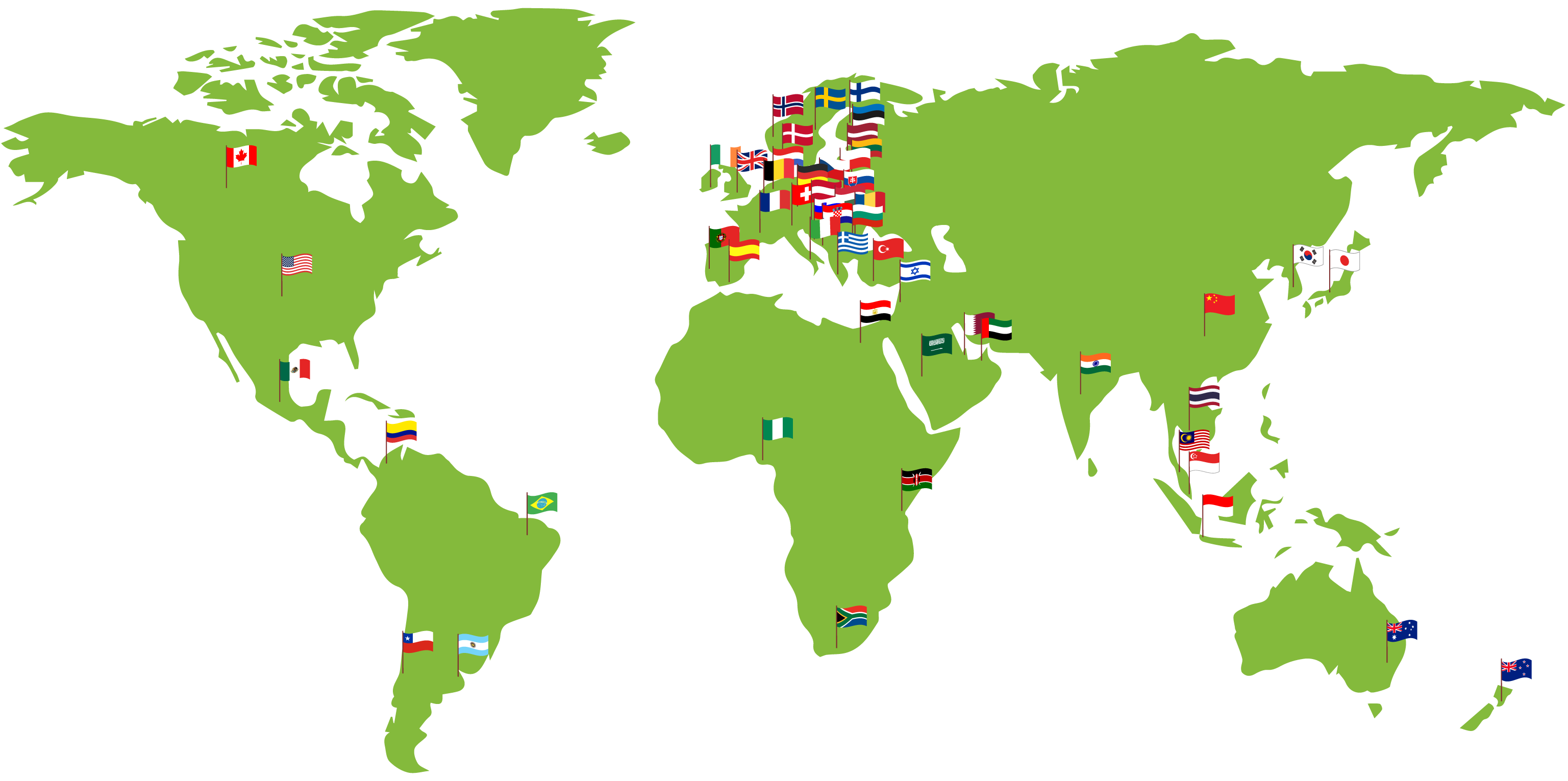Countries Covered
UX Fellows is your one-stop research resource for all markets listed here. UX research is sensitive to cultural differences. Here you can find our considerations about the particularities of each country.

All Countries
Americas
Europe
Middle East, Africa
Asia Pacific



Argentina

Argentina
- Be Warm and Personable: Argentines value relationships and friendliness; start with small talk and get to know participants a little before starting.
- Use Spanish: Most Argentines prefer Spanish; offering materials in Spanish will make participants feel more comfortable.
- Offer Meaningful Incentives: Cash or gift cards for popular stores or food delivery services are appreciated.
- Respect Timing Flexibility: Punctuality is less rigid than in other cultures, so allow a buffer for scheduling.
- Acknowledge Regional Diversity: Preferences and cultural norms can vary by region (e.g., Buenos Aires vs. northern areas).
- Avoid Discussing Sensitive Topics: Political and economic issues can be sensitive; avoid unrelated discussions on these topics.
- Don’t Rush Participants: Argentines value conversation; allow time for explanations and storytelling.
- Avoid Assuming Familiarity with Local English: While English is common in business settings, Spanish should be the default.
- Don’t Disregard Cultural Norms Around Food: Sharing food is common; offering a snack or coffee can help build rapport.
- January 1 New Year's Day.
- February/March Carnival: (two days, varies).
- March/April Holy Thursday and Good Friday: (dates vary).
- May 1 Labour Day
- July 9 Independence Day.
- June 20 National Flag Day.
- November 20 National Sovereignty Day.
- December 25 Christmas.
- Avoid Major Holidays: Especially during Carnival, Independence Day, and Christmas, as many people travel or take time off.
- Target Off-Peak Months: March, April, September, and early November are ideal with fewer interruptions from national holidays.
- Mid-Morning to Early Afternoon: 10 a.m. to 3 p.m. is a good range, avoiding both early morning and late evening.
- Consider Summer Break: December to February is summer vacation, so availability may be lower, especially in January.

Australia

Australia
- It is typically easy to schedule one-on-one research for day-time for general population audiences, evening sessions may be required for more specific audience types.
- It is recommended to pay participants in cash rather than vouchers, typical amounts are $80-$100 for a one-hour one-on-one research session for a generic audience, and $100-$120 for a 90-minute group session.
- Wherever possible, restrict length of research sessions to 60 minutes to maintain participant motivation and engagement improve ease of recruitment.
- If a client wants to recruit from a customer list try to encourage them to use an external recruiter as there are significant hurdles that need to be addressed when releasing customer contact details to third parties. If a client insists then ask them to send an invitation to participate in research to their customers and then pass on details of all who express an interest in participation.
- Don't pay participants their incentive until the research session is complete. Some recruitment firms will manage payment of incentives on your behalf for an extra fee.
- Try to avoid running research sessions on Fridays, or at least Friday afternoons, to reduce the likelihood of no-shows.
- It is recommended to allow a 30-minute gap between research sessions.
- It is not necessary to create a detailed recruitment screener, Australian recruitment firms are accustomed to receiving a specification detailing the requirements for a research project and then prepare a screener for your approval.

Austria

Austria
- Be Punctual and Organized: Austrians value punctuality, so arrive on time and follow the agenda closely.
- Use Formal, Polite Language: Maintain a respectful tone, particularly with new or older participants.
- Provide Information in German: Most Austrians prefer communication in German; bilingual options (German/English) may help with diverse audiences.
- Offer Practical Incentives: Vouchers, cash, or popular Austrian gift cards are appreciated.
- Respect Privacy: Adhere to GDPR guidelines and provide clear information on how data will be used.
- Avoid Overly Personal Questions: Austrians value privacy; avoid prying into personal matters unless necessary for the study.
- Don’t schedule interviews too close together (allow at least a 30 minute gap between sessions). This will accommodate both tardy participants as well as ones with longer sessions.
- Don’t Be Overly Casual: A professional tone is expected, especially in formal settings or with older demographics.
- Don’t Generalize: While similar, there are regional differences within Austria that may affect preferences.
- January 1 New Year's Day.
- January 6 Epiphany.
- March/April Easter Monday (date varies).
- May 1 Labor Day.
- 40 days after Easter Ascension Day.
- 50 days after Easter Whit Monday (Pentecost).
- 60 days after Easter Corpus Christi.
- August 15 Assumption Day.
- October 26 National Day.
- November 1. All Saints’ Day.
- December 8 Immaculate Conception.
- December 25 Christmas Day.
- December 26 St. Stephen’s Day.
- Avoid Major Holidays: Particularly Christmas, Easter, and National Day, as many people take extended breaks.
- Target Off-Peak Months: February, March, October, and early November are generally free of major holidays.
- Mid-Morning to Early Afternoon: 10 a.m. to 3 p.m. works well, avoiding lunch hours.
- Consider Summer Vacation (July-August): Many Austrians take vacations in summer, so participation may be lower.

Belgium

Belgium
- Respect Language and Regional Differences: Belgium has three official languages (Dutch, French, and German); adapt language to the region (Flanders, Wallonia, or Brussels).
- Be Punctual and Professional: Belgians value time and professionalism in research settings.
- Use Clear, Direct Language: Be straightforward in your communication, avoiding jargon.
- Offer Practical Incentives: Cash, vouchers, or popular local gift cards are generally appreciated.
- Ensure Privacy Compliance: Adhere to EU GDPR standards, as data privacy is taken seriously.
- Avoid Sensitive Regional Topics: Political and regional tensions can exist, so avoid delving into sensitive topics around regional identity.
- Don’t Generalize Across Regions: Preferences differ between Flemish and French-speaking areas, so consider them independently.
- Avoid Scheduling Over Meal Times: Lunch is typically taken seriously, often from 12-2 p.m.
- Don’t Use Casual or Overly Familiar Language: Maintain a professional tone, particularly in formal settings.
- January 1 New Year's Day.
- March/April Easter Monday (date varies).
- May 1 Labour Day.
- 40 days after Easter Ascension Day.
- 50 days after Easter Whit Monday (Pentecost).
- July 21 National Day.
- August 15 Assumption Day.
- November 1 All Saints’ Day.
- November 11 Armistice Day.
- December 25 Christmas.
- Avoid Major Holidays: National Day, Christmas, Easter, and summer vacation periods (July-August) when many take extended breaks.
- Target Off-Peak Months: February, March, October, and early November tend to be free from major holidays.
- Mid-Morning to Early Afternoon: 10 a.m. to 3 p.m. works well, avoiding lunch hours (12-2 p.m.).
- Consider Summer Breaks: July and August are popular vacation months, especially in the French-speaking south.

Brazil

Brazil
- Test interface in the native language.
- Expect some participants to arrive late (hence work out a 15-min delay) into your scheduling of participants.
- Expect participants to be very talkative.
- Have a duplicity system for video and audio recordings.
- Don’t use a prototype with content in more than one language.
- Don’t think that Brazilian and European dialects of Portuguese are interchangeable.
- Don’t think that because you understand Spanish that you will understand Portuguese (when observing).
- Remember that in the southern hemisphere Christmas is the beginning of summer vacations.
- February/March – Carnival holiday.
- Generally avoid holidays at Tuesdays and Thursdays because people will take off Monday or Friday, too.
- Avoid to schedule research with children and parents during January, July and December because of vacation periods at school.
- Many people work late so plan on having sessions as late as 8 or 9pm.

Bulgaria

Bulgaria
- Be Formal and Punctual: Formality is valued, especially in professional settings, and punctuality is appreciated.
- Use Bulgarian for Communication: English proficiency is common among younger generations, but using Bulgarian shows respect.
- Offer Cash or Gift Card Incentives: These are generally effective in encouraging participation.
- Avoid Personal or Political Topics: Discussions on political issues or personal matters can be sensitive.
- Don’t Assume English Proficiency in All Age Groups: Older participants may prefer Bulgarian.
- Avoid Scheduling During Lunchtime: Aim for early morning or later afternoon sessions.
- January 1 New Year's Day.
- March 3 Liberation Day.
- April/May Easter: Orthodox calendar.
- May 24 Saints Cyril and Methodius Day.
- December 24-26 Christmas.
- Avoid August and Easter: Many Bulgarians take holidays during these times.
- Ideal Months: February, March, October, and November, when availability is higher.

Canada

Canada
- Be Inclusive and Diverse: Canada has a multicultural population, so consider a range of cultural perspectives.
- Respect Personal Space and Time: Canadians appreciate punctuality and clear scheduling.
- Use Clear, Direct Language: Communicate clearly and avoid jargon, adapting language to participants’ levels of expertise.
- Offer Practical Incentives: Gift cards or cash incentives are popular; clarify if these are in CAD.
- Observe Privacy Regulations: Adhere to Canadian privacy laws like PIPEDA, ensuring transparency and data protection.
- Avoid Sensitive Topics: Generally, avoid discussing political views, income, or personal life unless relevant.
- Don’t Generalize Across Regions: Preferences vary by region (e.g., French-English differences in Quebec).
- Avoid Pressure: Canadians appreciate a relaxed approach; avoid pushy questions or sales-like tactics.
- Don’t Schedule Over Meals: Respect lunch hours (typically 12-1 p.m.) and avoid late evening times.
- January 1 New Year's Day
- February Family Day: (third Monday, varies by province)
- March/April Good Friday/Easter Monday: (dates vary).
- Late May Victoria Day
- July 1 Canada Day
- First Monday in September. Labour Day
- Second Monday in October. Thanksgiving
- December 25 Christmas
- December 26 Boxing Day (less significant for some regions).
- Avoid Major Holidays: Canada Day, Christmas, and Thanksgiving are widely celebrated and impact schedules.
- Target Off-Peak Months: February, April, and November are less likely to conflict with major holidays.
- Late Mornings to Early Afternoons: Typically 10 a.m. to 3 p.m., though flexible work arrangements may allow later slots.
- Consider Regional Weather: Harsh winters in some provinces may impact participation during January and February.

Chile

Chile
- Be Punctual and Respectful: Chileans value punctuality and professional courtesy, especially in business settings.
- Use Spanish for Communication: While English is common among younger participants, materials in Spanish are generally preferred.
- Offer Cash or Gift Card Incentives: Cash or popular store gift cards are appreciated and effective as incentives.
- Be Mindful of Regional Differences: Cultural norms can vary between urban and rural areas, so adapt as necessary.
- Avoid Political Topics: Discussions about politics, particularly related to historical events, can be sensitive.
- Don’t Assume All Participants Are Fluent in English: Providing Spanish-language resources is respectful and inclusive.
- Avoid Scheduling During Lunch (2-4 PM): Lunch is an important part of the day, often lasting longer than in other countries.
- January 1 New Year's Day.
- March/April Holy Week (Semana Santa): (Easter).
- May 1 Labour Day
- September 18-19 National Day (Fiestas Patrias).
- November 1 All Saints’ Day
- December 25 Christmas
- Avoid December, Easter Week, and Mid-September: Fiestas Patrias in September and the Christmas/New Year period are popular vacation times.
- Ideal Months: March, May, and October, when there are fewer holiday interruptions and good participant availability.

China

China
- Understand Cultural Nuances: Recognize regional and generational differences in preferences and behaviors.
- Build Relationships (Guanxi): Establish rapport with participants and partners; trust is highly valued.
- Adapt Research Methods: Use WeChat for recruitment, mobile-friendly surveys, and platforms familiar to participants.
- Use Local Moderators: Local facilitators are crucial for understanding subtle communication cues and language variations.
- Offer Practical Incentives: Cash incentives or vouchers are generally preferred over physical gifts.
- Avoid Sensitive Topics: Steer clear of politics, religion, or social controversies to avoid discomfort or legal issues.
- Don’t Overgeneralize: China has diverse regions with varying needs, so segment data carefully.
- Avoid Rushing: Take time to build trust and avoid pressure tactics.
- Don’t Disregard Compliance: Abide by local data privacy laws like the Personal Information Protection Law (PIPL).
- January/February (date varies) Chinese New Year (Lunar New Year): 7-day holiday, major travel period.
- April 4th-6th Tomb-Sweeping Day (Qingming Festival).
- May 1st – 3-day holiday Labor Day.
- June Dragon Boat Festival: (varies, based on lunar calendar).
- September/October Mid-Autumn Festival: (lunar calendar) – 3-day holiday.
- October 1st National Day: “Golden Week” 7-day holiday.
- Avoid National Holidays: Especially the Chinese New Year and October’s Golden Week.
- Target Off-Peak Months: Late March, May, and September are less likely to conflict with major holidays.
- Late Mornings & Early Afternoons: For weekday sessions, around 10 a.m. to 4 p.m. typically works best.
- Adapt for Regions: Different regions have varied work and meal schedules; adjust for urban vs. rural participants.

Colombia

Colombia
- If need to test something on a smartphone is better to specify on the screener what type of user the participant must be, since the penetration of both Android and Apple are pretty high.
- We usually conduct fieldwork in Bogota but for a major representation among the country, it is recommended to do it also at least in 2-3 cities according to the objectives of the projects (eg. Bogota and Medellin).
- Set up the interviews with 60 min between them. Colombian consumers not always arrive on time and that gap of time help to complete the day calendar in a better way.

Croatia

Croatia
- Be Direct and Professional: Croatians value clarity and professionalism in research contexts.
- Use Croatian if Possible: Although English is widely understood, Croatian materials are often preferred.
- Offer Cash or Popular Vouchers: These are generally effective incentives.
- Avoid Discussions on Sensitive Historical Topics: Avoid political or historical discussions.
- Don’t Assume English Proficiency in All Age Groups: English is commonly spoken, but Croatian materials are often appreciated.
- Avoid Informal Attire in Professional Settings: Smart-casual attire is usually best.
- January 1 New Year's Day.
- June 25 Independence Day.
- August 5 Victory and Homeland Thanksgiving Day.
- November 1 All Saints’ Day
- December 25-26 Christmas.
- Avoid July, August, and Christmas: Many Croatians take summer and Christmas vacations.
- Ideal Months: March, April, October, and November for fewer holiday disruptions.

Czechia

Czechia
- Be Punctual and Prepared: Czechs value punctuality and professionalism, so arrive on time and keep interactions formal and structured.
- Use Czech Language if Possible: Many Czechs speak English, but providing materials in Czech is preferable, especially with older participants.
- Provide Fair Incentives: Cash, vouchers, or small gifts are generally appreciated.
- Be Culturally Sensitive: Recognize and respect local traditions, values, and direct communication style.
- Avoid Casual Attire in Professional Settings: Business-casual attire is ideal; overly casual dress can be seen as unprofessional.
- Steer Clear of Sensitive Topics: Avoid political discussions, particularly around past regimes or neighboring countries.
- Avoid Overly Familiar Communication: While Czechs are polite, overly friendly or informal behavior can feel insincere.
- January 1 New Year's Day.
- March/April Easter Monday: Date varies
- May 1 Labour Day
- May 8 Liberation Day.
- July 5 St. Cyril and Methodius Day.
- July 6 Jan Hus Day.
- September 28 St. Wenceslas Day.
- October 28 Czechoslovak Independence Day.
- November 17 Struggle for Freedom and Democracy Day
- December 24-26 Christmas
- Avoid Major Holiday Periods: December (Christmas), Easter, and late July to August (vacation time) have lower availability.
- Ideal Months: March, June, September, and early November are optimal for high participation.
- Time of Day: Mid-morning (10 AM - 12 PM) and mid-afternoon (2 PM - 4 PM) are generally the best, as lunchtime is typically from 12 PM to 1 PM.

Denmark

Denmark
- Be Direct and Efficient: Danes value clear, concise communication and efficient processes, so get to the point without excessive small talk.
- Respect Privacy and Data Security: Privacy is highly valued in Denmark, and participants expect strict adherence to GDPR and data protection.
- Use English or Danish: English is widely spoken, especially in urban areas, but providing materials in Danish can be beneficial for broader participation.
- Offer Simple, Practical Incentives: Vouchers for popular stores or small cash incentives are generally well-received.
- Be Punctual: Danes appreciate punctuality, so start and finish on time.
- Avoid Unnecessary Formality: Danes have a flat hierarchy culture; avoid overly formal language and address participants by their first names.
- Don’t Intrude on Personal Space or Private Topics: Keep discussions professional and avoid overly personal questions.
- Avoid Flamboyant Dress: Dress modestly and practically; Danes favor simple, understated attire.
- Avoid Scheduling Over Lunch: Lunch is often a private break, so avoid scheduling during this time.
- January 1 New Year's Day.
- March/April Maundy Thursday & Good Friday (dates vary).
- March/April Easter Monday: (dates vary).
- Fourth Friday after Easter Great Prayer Day.
- 40 days after Easter Ascension Day.
- 50 days after Easter Whit Monday
- June 5 Constitution Day.
- December 25 Christmas Day
- December 26 Boxing Day
- Avoid Major Holidays: Especially Easter, Constitution Day, and Christmas, as many people take extended breaks.
- Target Off-Peak Months: February, March, September, and November have fewer holiday disruptions.
- Mid-Morning to Early Afternoon: 10 a.m. to 3 p.m. is ideal to avoid early mornings and late afternoons.
- Consider Summer Vacation: Many Danes take extended holidays in July, so participation may be lower during this time.

Egypt

Egypt
- Use Arabic: Most Egyptians prefer Arabic, especially in non-corporate settings. Offer materials in Arabic and ensure translations are accurate.
- Be Personable and Engage in Small Talk: Egyptians value friendly relationships; take time to build rapport with participants before starting.
- Be Flexible with Scheduling: Punctuality can be fluid, so plan for some flexibility in start times.
- Offer Practical Incentives: Cash, mobile credits, or food vouchers are appreciated and culturally appropriate.
- Respect Cultural Norms: Dress conservatively, especially when interacting with more traditional or religious groups.
- Avoid Political and Religious Discussions: These topics can be sensitive; keep conversations focused on the research topic.
- Don’t Schedule During Prayer Times: Be mindful of prayer times, particularly in observant communities.
- Avoid Public Criticism: Egyptians value respectful communication; use constructive feedback rather than direct criticism.
- Don’t Assume Internet Availability Everywhere: Connectivity may vary, especially in rural areas, so plan accordingly.
- January 1 New Year's Day.
- January 25 Revolution Day.
- Eid al-Fitr: Date varies (end of Ramadan).
- May 1 Labour Day
- Eid al-Adha: Date varies (approximately 70 days after Eid al-Fitr).
- July 23 Revolution Day.
- Islamic New Year: Date varies.
- October 6 Armed Forces Day.
- Prophet’s Birthday: Date varies.
- January 25 Christmas (Coptic).
- Avoid Major Holidays: Eid al-Fitr, Eid al-Adha, and Ramadan, as many people observe these holidays with family.
- Target Off-Peak Months: February, March, October, and November typically have fewer interruptions.
- Mid-Morning to Early Afternoon: 10 a.m. to 3 p.m. works well, avoiding early morning and evening commutes.
- Consider Friday and Weekend Impact: Fridays are holy days, so research activities are better scheduled Sunday through Thursday.

Estonia

Estonia
- Estonians can be difficult to approach.
- Facebook is a great way of finding test subjects, but nobody uses Twitter.
- Gift cards and chocolates are valid incentives (their value ranges between 2-100 euros depending on what you are testing).
- Generally it is not a good idea to call a potential recruit after 6pm.
- Don’t schedule sessions too close together, as it is very possible people will be running late and that will affect the time the session starts.
- January 1 New Year’s Day.
- February 24 Independence Day.
- April 18 Good Friday.
- April 20 Easter.
- May 1 Spring Day.
- June 8 Pentecost.
- June 23 Victory Day.
- June 24 St. John’s Day.
- August 20 Day of Restoration of Independence.
- December 25 Christmas.
- Try to avoid testing on weekends and specific holidays. During the summer people will move to the countryside and are generally harder to reach.

Finland

Finland
- January 1 New Year's Day
- January 6 Epiphany
- April 10 Good Friday
- April 12 Easter
- April 13 Easter Monday
- May 1 Vappu
- May 21 Ascension Day
- May 31 White Sunday
- June 19 Midsummer Eve
- June 20 Midsummer
- November 2 All Saints’ Day
- December 6 Independence Day
- December 24 Christmas Eve
- December 25 Christmas Day
- December 26 Boxing Day
- July is the most popular holiday month.
- Prefer weekdays.
- Evenings are ok.

France

France
- Conduct interviews and tests in French.
- Provide fake testing data, if there is a need to fill a form.
- Don't ask for any personal data (names, address, email, etc.) during the interview if you keep a recording. French law can be quite challenging on this matter.
- Don't plan any session during the weekend, bank holidays or peak holiday season (May, July/August, December).
- Testing time can depend on the target (student vs professional), but usually it's best to keep it during office hours (8am to 8pm).

Germany

Germany
- Providing fake test data is advisable. If individual data is required, test people should be asked beforehand.
- Inform subjects beforehand about filming, sound recording and eye tracking. Ideally, let them additionally agree in writing before test.
- Remember that Germans tend to describe their feedback in more utilitarian terms rather than being descriptive regarding visual elements.
- Don't use scaled with opposite logic.
- Don't forget to always follow-up. Provide confirmation emails with directions, call them one day before testing and ask them to be there a few minutes earlier.
- Unlike in other countries, during school holidays recruitment doesn't get more difficult, some people have even better availability.
- Recruit can become more difficult when important events are taking place or the weather is nice outside.
- Most evenings (from 5pm to 10pm) because of working hours.
- Plan enough evening appointments.

Greece

Greece
- Be Friendly and Build Rapport: Greeks appreciate a friendly, warm approach. Small talk before diving into the session helps establish a comfortable atmosphere.
- Use Greek Language if Possible: While many Greeks, especially younger participants, speak English, using Greek language materials shows respect and increases inclusivity.
- Offer Generous Incentives: Cash or popular vouchers are appreciated; fair incentives encourage participation.
- Acknowledge Cultural Values: Greeks take pride in their cultural heritage, so showing awareness or appreciation can build rapport.
- Avoid Discussing Political Issues: Topics such as recent economic challenges or historical conflicts can be sensitive.
- Don’t Rush: Greeks often appreciate taking their time in discussions; rushing through can come off as impolite.
- Avoid Overly Formal Communication: While respect is essential, Greeks tend to prefer a balance of professionalism and friendliness.
- January 1 New Year's Day.
- January 6 Epiphany.
- 40 days before Easter Clean Monday: Date varies (beginning of Lent).
- March 25 Greek Independence Day.
- April/May Orthodox Easter: Date varies (with Good Friday and Easter Monday off).
- May 1 Labour Day.
- August 15 Assumption of Mary.
- October 28 Ohi Day.
- December 25-26 Christmas.
- Avoid Easter and Summer Months (July-August): Orthodox Easter and summer are peak vacation periods, with many businesses closed in August.
- Best Months: February, May, October, and November offer better availability.
- Time of Day: Late mornings (10 AM - 12 PM) or afternoons (2 PM - 5 PM) work best, avoiding the lunch break around 1 PM.

Hungary

Hungary
- Be Punctual and Professional: Hungarians value punctuality and professionalism in business settings, so be timely and organized.
- Use Hungarian if Possible: While many people, especially younger generations, speak English, providing materials in Hungarian shows respect.
- Provide Fair Incentives: Cash or vouchers are common and well-received as incentives.
- Be Direct and Clear: Hungarians appreciate clear communication and directness in professional interactions.
- Avoid Overly Familiar Communication: Keep the tone formal at the start, as overly casual behavior may come across as insincere.
- Steer Clear of Political or Sensitive Topics: Discussions on Hungary’s political history or sensitive national topics should be avoided unless relevant.
- Don’t Rush the Interaction: A well-paced, structured approach is preferred, especially during the initial interaction.
- January 1 New Year's Day.
- March 15 1848 Revolution Day.
- March/April Good Friday & Easter Monday: Dates vary.
- May 1 Labour Day.
- May/June Pentecost Monday: Date varies.
- August 20 St. Stephen’s Day.
- October 23 1956 Revolution Memorial Day.
- November 1 All Saints’ Day.
- December 25-26 Christmas.
- Avoid Holidays and August: August is a peak vacation month, and availability drops around major holidays.
- Best Months: February, March, October, and early November generally provide the best availability.
- Time of Day: Late mornings (10 AM - 12 PM) or afternoons (2 PM - 5 PM) work well, as lunch is typically around 12 PM.

India

India
- Respect Cultural Diversity: Be mindful of regional, linguistic, and religious diversity.
- Establish Rapport: Warm up with casual conversation; Indians value personal connections.
- Consider Language Preferences: Conduct research in the local language or offer multilingual options.
- Use Local Moderators: They understand cultural nuances, colloquial language, and body language.
- Offer Useful Incentives: Cash or e-wallet vouchers are preferred, but adapt to the context (e.g., rural vs. urban).
- Avoid Sensitive Topics: Stay clear of religion, caste, and politics unless specifically relevant to your study.
- Don’t Generalize: India is highly diverse; avoid assuming that findings in one region apply to others.
- Avoid Last-Minute Requests: Planning ahead is important due to varied schedules and logistical challenges.
- Don’t Disregard Privacy Concerns: Comply with the Indian Data Protection Law (once implemented) and ensure transparency in data use.
- October/November Diwali: 5-day festival, main holiday for most Indians.
- March Holi: 2-day celebration, especially popular in North India.
- August 15 Independence Day: nationwide holiday.
- January 26 Republic Day: nationwide holiday.
- Eid al-Fitr and Eid al-Adha: Dates vary; widely observed among Muslims.
- Mid-January Pongal/Makar Sankranti/Lohri: celebrated across different regions.
- September/October Dussehra: (depends on region) – leads up to Diwali.
- December 25 Christmas: especially significant in Southern and Northeastern.
- Avoid Major Festivals: Diwali, Holi, Eid, and Christmas are family-centered and disrupt schedules.
- Best Months: February, April, and September are less affected by holidays and peak travel times.
- Late Morning and Early Afternoon: 10 a.m. to 3 p.m. generally works best, but consider regional work hours.
- Consider Exam Periods: For younger participants, avoid April-May and October-November due to academic exams.

Indonesia

Indonesia
- Respect Cultural Diversity: Indonesia has many ethnic groups; be mindful of local customs and languages.
- Build Personal Connections: Indonesians value friendly, personal interactions before diving into research questions.
- Use Local Moderators: They help navigate cultural nuances and language variations across regions.
- Offer Appealing Incentives: Cash or digital wallet vouchers (e.g., GoPay, OVO) are preferred.
- Adapt to Local Tech Habits: Popular platforms include WhatsApp, Instagram, and Tokopedia for recruitment and engagement.
- Avoid Sensitive Topics: Steer clear of religion and political issues unless relevant to your study.
- Don’t Rush: Take time for informal chatting, as Indonesians value politeness and a relaxed approach.
- Avoid Scheduling During Prayer Times: For Muslim participants, respect the five daily prayers, particularly Friday midday prayers.
- Don’t Overlook Regional Differences: Preferences vary across Java, Sumatra, Bali, and other islands.
- January 1 New Year’s Day
- January/February (lunar calendar) Chinese New Year: celebrated widely by Chinese-Indonesian communities.
- Eid al-Fitr (Lebaran): Based on lunar calendar, significant 1-week holiday with high travel.
- Eid al-Adha: Based on lunar calendar, widely observed.
- August 17 Independence Day.
- Maulid Nabi (Prophet’s Birthday): Based on lunar calendar.
- December 25 Christmas Day.
- Avoid Major Holidays: Particularly Ramadan, Eid al-Fitr, and Eid al-Adha as these are major observances.
- Target Off-Peak Months: February, March, September, and November are generally free from major holidays.
- Late Mornings to Early Afternoons: 10 a.m. to 3 p.m. works best, avoiding early mornings and late evenings.
- Consider Prayer Schedules: For Muslim-majority groups, avoid prayer times, especially Friday noon prayers.

Ireland

Ireland
- Build Rapport with Small Talk: Irish people value friendly interaction; brief small talk can help establish rapport.
- Be Punctual but Flexible: Arriving on time is appreciated, but a slightly relaxed schedule is often acceptable.
- Use Clear, Direct Language: Avoid complex jargon and be straightforward in your communication.
- Respect Privacy and Data Handling: Adhere to GDPR guidelines; data privacy is important to Irish participants.
- Offer Appealing Incentives: Cash, gift vouchers, or online retail vouchers are commonly appreciated.
- Avoid Political or Religious Discussions: Topics around Northern Ireland, religion, and politics can be sensitive, so approach with care if relevant.
- Don’t Assume “British” Identity: Be mindful of cultural identity; the Irish often prefer “Irish” rather than “British.”
- Avoid Overly Formal Dress: Business casual attire is generally well-received and suitable.
- Don’t Rush the Conversation: Irish culture values storytelling; give space for longer responses if needed.
- January 1 New Year's Day
- March 17 St. Patrick’s Day (major national celebration).
- March/April Easter Monday (date varies).
- First Monday in May May Day.
- First Monday in June June Bank Holiday.
- First Monday in August August Bank Holiday.
- Last Monday in October October Bank Holiday.
- December 25 Christmas Day.
- December 26 St. Stephen’s Day.
- Avoid Major Holidays: Especially St. Patrick’s Day, Easter, and Christmas, as these are widely celebrated and many take extended breaks.
- Target Off-Peak Months: February, April, September, and early November tend to be quieter months with fewer holidays.
- Mid-Morning to Early Afternoon: 10 a.m. to 3 p.m. is a good range, avoiding early morning and late afternoon commutes.
- Consider Summer Vacations: July and August are popular holiday months, so participation may be lower during this period.

Israel

Israel
- Plan for Direct Communication: Israelis are known for being straightforward; expect open feedback and value honesty in responses.
- Consider Language Preferences: Hebrew is the primary language, but English is widely understood, especially in urban areas.
- Respect Jewish Cultural Norms: Familiarize yourself with local customs, especially if researching in more religious areas.
- Provide Practical Incentives: Cash, digital payment, or local gift cards (like for food delivery) are commonly appreciated.
- Acknowledge Security Concerns: Security checks are routine in many areas; plan ahead if meeting in person.
- Avoid Political Discussions: Politics can be sensitive; avoid unrelated political discussions.
- Don’t Overlook Shabbat: From Friday evening to Saturday evening, many people rest or attend services; plan accordingly.
- Avoid Overly Formal Attire: Business casual is usually sufficient unless meeting in very formal settings.
- Don’t Assume Work Hours are the Same: Sunday to Thursday is the work week; weekends are Friday-Saturday.
- March/April Passover (Pesach): (varies, lasting about a week).
- April/May Independence Day: (based on the Hebrew calendar).
- September/October Rosh Hashanah (Jewish New Year): (varies, two days).
- September/October Yom Kippur (Day of Atonement): (varies, a single day when almost all activity stops).
- September/October Sukkot: (varies, lasts a week).
- December Hanukkah: (eight days).
- March Purim: (one day, varies).
- Avoid Major Holidays: Yom Kippur, Passover, and Rosh Hashanah, as many people observe these fully.
- Target Off-Peak Months: February, May (post-Passover), and November tend to be less affected by major holidays.
- Mid-Morning to Early Afternoon: 10 a.m. to 3 p.m. is ideal, especially on weekdays.
- Consider Summer Vacation: July and August are peak vacation times; participation may be lower during this period.

Italy

Italy
- Conduct interviews in local language.
- No-show rate is possible, plan spare participants.
- Schedule the research in advance, if possible.
- Expect differences in computer literacy based on socio-demographic variables.
- Having a good sense of Italian socio-demographic factors will help increase the amount of suitable participants gained.
- Providing fake test data is advisable. If individual data is required, this should be asked during recruiting.
- Do not schedule testing just before local bank holidays and on August.
- Do not include small cities in the sample, favor principal cities such as Milan, Rome and Naples.
- Not possible to give cash incentives, provide coupons (petrol, Amazon).
- Don’t do testing during peek holidays, including Christmas and Easter.
- No testing during August, all facilities are closed.
- Testing time depends on the target (pm for working people and students, am for retired people and housewives).

Japan

Japan
- Be precise and aware of the questions you are giving to the audience.
- Make sure you are focusing on your target and their attributes.
- Participants are known to be timely and rarely appear as a “no show”.
- Schedule translators far in advance, the good ones are usually quite busy.
- Make the audience feel comfortable and invited, don’t overbear with irrelevant content or dismiss their answers.
- Targeting specific groups can be costly, in comparison to US and Europe.
- Don’t assume - always have content translated in Japanese, although most citizens learn English at a young age.
- Avoid the last week of December and the first week of January.
- Golden week – This falls at the end of April/first week of May.
- Obon Summer Holiday period – The second week of August through the middle of the third week of August.
- Housewives – weekday mornings and afternoons.
- University students – weekday and weekend afternoons.
- Full time workers – weekday evenings (after 7pm) or weekends.

Kenya

Kenya
- Be Friendly and Patient: Kenyans value friendliness, and a warm, respectful approach helps build rapport.
- Use English or Swahili: Both languages are widely spoken, but English is often preferred in formal settings.
- Offer Fair Incentives: Cash or mobile money transfers are common, as digital payments are widely used.
- Acknowledge Cultural and Religious Sensitivities: Kenya has diverse cultural and religious backgrounds, so be considerate, especially if discussing sensitive topics.
- Avoid Stereotypes and Assumptions: Avoid generalizations about Kenyan culture, as there is significant diversity across regions and groups.
- Do Not Schedule During Prayer Times on Fridays: For Muslim participants, respect the midday prayer on Fridays.
- Avoid Political Discussions: Politics can be sensitive; stay focused on the research topic.
- January 1 New Year's Day.
- March/April Good Friday and Easter Monday: Dates vary.
- May 1 Labour Day.
- June 1 Madaraka Day (Self-Governance Day).
- Eid al-Fitr: Date varies
- October 20 Mashujaa Day (Heroes’ Day).
- December 12 Jamhuri Day (Independence Day).
- December 25-26 Christmas and Boxing Day.
- Avoid Holiday Seasons (December and Easter): These are peak times for travel and family gatherings.
- Best Months: February, March, September, and October offer better participant availability.
- Time of Day: Late mornings (10 AM - 12 PM) or afternoons (2 PM - 4 PM) are ideal, avoiding lunch and Friday prayer times.

Latvia

Latvia
- Be Respectful and Formal: A polite and formal approach is valued in Latvia.
- Provide Latvian Translations: Though English is commonly spoken among younger people, Latvian materials are preferable.
- Offer Cash or Voucher Incentives: Cash or gift cards are effective.
- Avoid Sensitive Historical and Political Discussions: Topics related to the Soviet era can be sensitive.
- Don’t Assume English Proficiency for Older Participants: English is more common among younger Latvians.
- Avoid Scheduling During National Festivals: Public holidays and national events are widely observed.
- November 18 Independence Day.
- June 23-24 Līgo and Jāņi (Midsummer).
- November 18 Proclamation Day of the Republic of Latvia.
- December 25 Christmas Day.
- January 1 New Year’s Day.
- Avoid Late June, November, and December: Many take vacations around Midsummer and Christmas.
- Ideal Months: March, April, and October.

Lithuania

Lithuania
- Be Formal and Respectful: Lithuanians appreciate professionalism, especially in business settings.
- Use Lithuanian Language Materials if Possible: English is commonly understood among younger people, but Lithuanian is preferred.
- Offer Cash or Voucher Incentives: Cash or local store vouchers are effective incentives.
- Avoid Political Discussions: Avoid sensitive topics, particularly related to the Soviet era.
- Don’t Assume Familiarity with English for Older Participants: Younger generations speak English more fluently.
- Avoid Overly Casual Dress: Business-casual attire is appropriate in most settings.
- February 16 Independence Day.
- March 11 Restoration of Independence Day.
- June 24 Saint John’s Day (Joninės).
- November 1 All Saints’ Day.
- December 24-26 Christmas.
- Avoid Late December and Summer Holidays (July-August): Many take time off during these periods.
- Ideal Months: March, April, October, and November.

Malaysia

Malaysia
- Be Polite and Respectful: Malaysians value courtesy and a friendly approach.
- Accommodate Language Preferences: Use English, Malay (Bahasa Malaysia), Mandarin, or Tamil, depending on the demographic.
- Offer Practical Incentives: Cash, gift cards, or e-wallet credits are typically well-received.
- Be Aware of Cultural Sensitivities: Understand religious practices (e.g., Islam) and be mindful of dress codes, especially for in-person interviews.
- Avoid Sensitive Topics: Refrain from discussing politics, race, or religion.
- Don’t Schedule Sessions During Prayer Times for Muslim Participants: Malaysia has a significant Muslim population, and daily prayers are observed.
- Avoid Overly Casual Attire in Formal Settings: Business casual is generally preferred, particularly in corporate environments.
- January/February Chinese New Year: (varies, 2-day holiday).
- Hari Raya Aidilfitri (Eid al-Fitr): Date varies (end of Ramadan, 2-day holiday).
- August 31 Hari Merdeka (Independence Day).
- October/November Deepavali: (Hindu festival, varies).
- Hari Raya Haji (Eid al-Adha): Date varies.
- December 25 Christmas
- Avoid Major Holidays: Chinese New Year, Hari Raya Aidilfitri, Hari Raya Haji, and Deepavali, as these are widely observed.
- Ideal Months: March, April, September, and early November, as these periods avoid major holiday disruptions and ensure higher availability among participants.

Mexico

Mexico
- Mexico is a pluricultural country with substancial behavorial differences, due to the large size of the country, that's why is recommended to replicate the project in different cities, being Mexico City, Monterrey and Guadalajara the most common ones.
- Most people use an Android operating system as a smartphone, so it is important to have devices that record or allow browsing-in, different versions to avoid losing details.
- It is advisable not to make groups whose participants belong to very different socio-economic segments, since those with the highest purchasing power can speak from a particular context and consequently, inhibit or introvert those who have less access.
- Ask participants to arrive one hour before starting, is recommended as the city and distances make it impossible for people to arrive on time.

Netherlands

Netherlands
- Invite participants to come 10 minutes earlier.
- Invite a spare or floater to prevent no-shows.
- Take about 2 weeks for finding the best matching participants.
- Ask to much about personal details, work with dummy details instead.
- Don’t be to formally, It’s best to have an open and relaxed conversation.
- Main holidays are:
- New years day (1 January)
- Good Friday (end March to mid-April)
- Easter (end March to mid-April)
- Kingsday (27 April)
- Liberation day (5 May)
- Ascension Day (mid-May)
- Pentecost (end May to mid-June)
- Christmas to NYE (25 to 31 December)
- It’s best to schedule during daytime.
- Hard to reach audiences can be planned during evenings or sometimes testing remotely is a better option.
- National holidays can be hard, depending on the audience your looking for.
- For example parents and/or kids are easier to find during the holiday season.

New Zealand

New Zealand
- Be Friendly and Casual: Kiwis (New Zealanders) appreciate relaxed, approachable interactions and often prefer an informal communication style.
- Use English and Provide Clear Information: English is the primary language; straightforward communication is valued.
- Offer Fair Incentives: Cash or vouchers are standard and generally effective as incentives.
- Be Environmentally Aware: Sustainability and environmental consciousness are valued, so consider these aspects when presenting research materials or incentives.
- Avoid Stereotyping or Comparisons: Avoid stereotypes or comparing New Zealand to Australia, as this can be seen as insensitive.
- Don’t Rush Conversations: Kiwis appreciate friendliness and may take a moment for informal chat before getting into formal discussions.
- Avoid Scheduling During Public Holidays or Sports Events: Major sports events, especially rugby matches, can impact attendance.
- January 1 New Year's Day.
- February 6 Waitangi Day (celebrates the Treaty of Waitangi).
- April 25 Anzac Day.
- First Monday in June Queen’s Birthday.
- Fourth Monday in October Labour Day.
- December 25-26 Christmas and Boxing Day.
- Avoid December, January, and February: These are peak summer months with high holiday and travel activity.
- Ideal Months: March, May, September, and November are best for availability.
- Time of Day: Late mornings (10 AM - 12 PM) and mid-afternoons (2 PM - 4 PM) are ideal, as lunch is usually around 12 PM.

Nigeria

Nigeria
- Build Rapport: Nigerians value relationship-building, so start with small talk to build trust.
- Consider Language Preferences: English is widely spoken, but understanding local languages (Yoruba, Igbo, Hausa) can help in certain regions.
- Be Flexible with Time: Punctuality may vary; allow for some flexibility in scheduling.
- Offer Practical Incentives: Mobile top-ups, cash, or bank transfers are preferred.
- Acknowledge Hierarchy and Respect Elders: Respect seniority, especially in group settings.
- Avoid Sensitive Topics: Discussions around politics, religion, or ethnicity should be approached carefully or avoided.
- Don’t Assume Internet Access Everywhere: While urban areas are well-connected, rural regions may have limited internet.
- Avoid Overly Casual Attire: Dress professionally, especially in business settings.
- Avoid Direct Criticism: Indirect or tactful phrasing is preferred to avoid confrontation.
- January 1 New Year's Day.
- March/April Good Friday/Easter Monday (dates vary).
- May 1 Workers’ Day.
- June 12 Democracy Day.
- Eid al-Fitr: Date varies (based on lunar calendar).
- Eid al-Adha: Date varies (based on lunar calendar).
- October 1 Independence Day.
- December 25 Christmas Day.
- December 26 Boxing Day.
- Avoid Major Holidays: Eid holidays, Independence Day, Christmas, and New Year when many take extended breaks.
- Target Off-Peak Months: February, March, October, and November have fewer holidays.
- Mid-Morning to Early Afternoon: 10 a.m. to 3 p.m. is ideal, as it avoids early morning and evening commute times.
- Consider Weather: The rainy season (April-October) can affect attendance, especially in rural areas.

Norway

Norway
- Be Punctual and Organized: Norwegians value punctuality and efficiency. Start and end on time and maintain a structured agenda.
- Use Clear, Direct Communication: Norwegians prefer directness; keep instructions and questions straightforward and concise.
- Respect Personal Space and Privacy: Privacy is highly valued, so ensure all GDPR protocols are clear and strictly followed.
- Offer Modest, Practical Incentives: Vouchers for popular stores or cash incentives are appreciated.
- Respect Environmental Consciousness: Consider eco-friendly practices, as Norwegians value sustainability.
- Avoid Overly Personal Questions: Avoid probing into personal or family matters, as privacy is deeply respected.
- Don’t Overemphasize Hierarchies: Norway has a flat hierarchy culture, so avoid overly formal titles and address participants by first names.
- Avoid Scheduling Over Meal Times: Meal times, especially lunch, are personal breaks; avoid scheduling during these periods.
- Avoid Stereotypes: Avoid assumptions based on Scandinavian stereotypes; focus on data and insights specific to Norway.
- January 1 New Year's Day.
- March/April Maundy Thursday & Good Friday (dates vary).
- March/April Easter Monday: (dates vary).
- May 1 Labour Day
- May 17 Constitution Day: (celebrated nationwide).
- May/June Ascension Day: (dates vary).
- May/June Whit Monday (Pentecost): (dates vary).
- December 25 Christmas
- December 26 Boxing Day
- Avoid Major Holidays: Especially around Easter, Constitution Day, and Christmas, as many people take extended breaks.
- Target Off-Peak Months: February, March, October, and early November are usually free of major holidays.
- Mid-Morning to Early Afternoon: 10 a.m. to 3 p.m. works best, avoiding early morning and late evening.
- Consider Summer Vacation (July): Many Norwegians take extended vacations in July, so participation may be lower during this time.

Poland

Poland
- Use as many channels as you can to recruit users for research and describe very precisely research assumptions in the public offer (info about salary is highly expected).
- Verify users' details in recruitment process to identify and reject experienced UX research participants, which you can easily find in the market.
- Always prepare a reserve list of users for research (about 30-40% more) in case of sudden absences.
- Always inform users about any recording or filming before the research, ask for formal permission.
- When it comes to individual interviews, better talk in Polish. Not many people speak English on a level which gives them possibility to express themselves freely.
- You cannot pay participants (with money) without any formal contracts (financial law issues).
- Do not ask users for the use of their personal information, always prepare a scenario based on some fake information.
- Do not pay users in advance, always after finishing all tests and interviews.

Portugal

Portugal
- Warn participants beforehand to make sure they keep their appointment.
- Participants expect to receive an incentive. The easiest way is to give them a gift card that can be used in several stores.
- Deliver the incentive right after they sign the consent form.
- The interface should be in the native language, even though English is also suitable.
- Avoid scheduling sessions on Mondays and Fridays, as it will be harder to recruit participants for those days.
- Don’t schedule interviews too close together (allow at least a 30 minute gap between sessions). This will accommodate both tardy participants as well as ones with longer sessions.
- Don’t plan more than 5 or 6 test sessions a day.
- Avoid doing testing during peak holidays, like the Christmas Holidays and Easter. Peak Summertime (July and August) should also be avoided.
- Avoid testing just before or after public Holidays as most people will take extended weekends on those dates.
- Carnival is an unofficial Holiday, but still observed by government and private workers.
- Unlike some other countries, most Holidays in Portugal are observed on the day on which they fall.
- Januray 1 New Year's Day
- Good Friday
- April 25 Freedom Day
- May 1 Labour Day
- June 10 Portugal Day
- August 15 Feast of Assumption
- October 5 Republic Day
- November 1 All Saints Day
- December 1 Restoration of Independence Day
- December 8 Immaculate Conception
- December 25 Christmas Day
- Usually it’s easier to recruit for late afternoon (after work), after 6pm.
- Testing can start as early as 9AM.
- Testing time depends on the target, but allow for at least an hour.

Qatar

Qatar
- Be Respectful and Culturally Sensitive: Respect local customs and dress modestly, particularly when meeting in public.
- Use Arabic or English: English is widely spoken, but using Arabic phrases can be appreciated and help build rapport.
- Offer Generous Incentives: Cash or gift cards are generally well-received.
- Acknowledge Prayer Times: Be aware of prayer times and allow breaks if necessary, especially with Muslim participants.
- Avoid Sensitive Topics: Discussions on politics, religion, and sensitive social issues should be avoided.
- Do Not Schedule During Prayer Times: Friday midday prayers are particularly significant; avoid scheduling research around this time.
- Avoid Casual Attire: Business-casual dress is preferred in professional settings.
- Second Tuesday in February National Sports Day.
- Eid al-Fitr: Date varies (end of Ramadan, 3-day holiday)
- Eid al-Adha: Date varies (approx. 70 days after Eid al-Fitr, 3-day holiday)
- December 18 Qatar National Day.
- Islamic New Year: Date varies
- Avoid Ramadan and Eid Holidays: Ramadan (dates vary annually) and Eid holidays significantly impact availability.
- Best Months: February, March, October, and November generally have higher availability.
- Time of Day: Late mornings (10 AM - 12 PM) or mid-afternoons (2 PM - 4 PM) work well, avoiding prayer times and lunch.

Romania

Romania
- Show Respect and Professionalism: Romanians value politeness and professionalism. Being courteous and showing genuine interest helps build rapport.
- Use Romanian or Provide Translations: While many people, especially younger participants, speak English, Romanian is preferred for comfort and inclusivity.
- Offer Attractive Incentives: Cash, gift cards, or popular e-vouchers work well as incentives.
- Understand Regional and Cultural Nuances: Urban areas (like Bucharest) may differ from rural ones in language preferences and formality.
- Avoid Political Topics: Discussions around politics, particularly about communism or historical events, can be sensitive.
- Don’t Assume Fluency in English: While younger generations often know English, providing resources in Romanian is considerate.
- Avoid Scheduling During Lunch (1–3 PM): Lunch is typically a substantial, longer meal in Romania, so schedule around it when possible.
- January 1-2 New Year's Day.
- April or May Orthodox Easter: Date varies.
- May 1 Labour Day.
- August 15 Assumption of Mary.
- December 1 National Day (Great Union Day).
- December 25 Christmas.
- Avoid December, Easter, and August: December holidays, Orthodox Easter, and August are popular for vacations, limiting availability.
- Best Months: February, March, and October generally offer higher participant availability.
- Best Time of Day: Late mornings or mid-afternoons (10 AM - 12 PM, 3 PM - 5 PM) work well for most, avoiding lunchtime.

Saudi Arabia

Saudi Arabia
- Respect Cultural Norms: Saudi Arabia has conservative social norms, so dress and language should be professional and respectful.
- Be Aware of Gender Sensitivities: Gender-segregated spaces may apply; ensure gender-appropriate facilitators for mixed groups.
- Use Arabic or Bilingual Materials: Arabic is the primary language, though English is also widely understood in urban areas.
- Adapt to Local Digital Preferences: Platforms like WhatsApp and Snapchat are popular for communication and recruitment.
- Offer Appealing Incentives: Cash or electronic vouchers are generally well-received.
- Avoid Sensitive Topics: Topics around religion, politics, or social norms can be sensitive and should be avoided unless essential to research.
- Don’t Rush Relationship Building: Take time for greetings and social pleasantries, as this is culturally appreciated.
- Avoid Scheduling During Prayer Times: Daily prayers (five times) are observed strictly; Friday noon prayer is especially significant.
- Avoid Casual Language or Dress: Maintain a formal, respectful approach, especially with older participants.
- Eid al-Fitr: End of Ramadan – significant holiday, typically lasting 1 week.
- Eid al-Adha: During Hajj season – major holiday, typically lasting 1 week.
- September 23 Saudi National Day.
- Ramadan: Month of fasting (dates vary by lunar calendar) – work hours are shortened, and schedules shift.
- Avoid Major Holidays: Eid al-Fitr, Eid al-Adha, and Ramadan as schedules and participation rates are impacted.
- Target Off-Peak Months: February, March, October, and November are generally free of major holidays.
- Late Morning to Early Afternoon: 10 a.m. to 3 p.m. works best, avoiding prayer times and the midday meal.
- Adapt to Prayer Schedules: Factor in five daily prayers when planning, especially midday and evening times.

Singapore

Singapore
- Do basic conversation screening of participants through phone calls.
- Official form to ask participants’ permission for video recording for any form of research interviews.
- Plan for minimum 30 minutes buffer in between interview sessions.
- Send gentle reminders (sms or email) to participants on the scheduled session one day before and one hour before.
- Not allowed to collect full identification number from participants for incentives collection.
- Do not schedule any interview research sessions not within central business district area.
- Interviewers do not need to dress formally when conducting research interview sessions.
- 2019:
- June 5 Hari Raya Puasa
- August 9 National Day
- August 11-12 Hari Raya Haji
- October 27-28 Deepavali
- December 25 Christmas Day
- 2020:
- January 1 New Year's Day
- January 24-28 Chinese New Year
- April 10 Good Friday
- May 1 Labour Day
- May 7 Vesak Day
- May 24-25 Hari Raya Puasay
- July 31 Hari Raya Haji
- August 9-10 National Day
- November 13-14 Deepavali
- December 25 Christmas Day
- Weekdays starts from 10am - 6pm (Company's policy for not asking team members to do research in evenings or weekends).

Slovakia

Slovakia
- Be Punctual and Professional: Slovakians value timeliness and professionalism, so be well-prepared and punctual.
- Use Slovak if Possible: While many younger people speak English, using Slovak for materials and introductions shows respect.
- Offer Appropriate Incentives: Cash or popular vouchers are appreciated as incentives for participation.
- Be Direct and Clear: Slovaks appreciate straightforward, no-nonsense communication and professionalism.
- Avoid Casual Dress in Formal Settings: Overly casual attire can be perceived as disrespectful in a professional setting.
- Avoid Sensitive Political Discussions: Topics related to regional politics or history can be sensitive; stay focused on research topics.
- Don’t Rush: Allow participants time to express their thoughts, as Slovaks value well-considered responses.
- January 1 New Year's Day.
- January 6 Epiphany.
- March/April Easter Monday: Date varies.
- May 1 Labour Day.
- May 8 Victory in Europe Day.
- July 5 St. Cyril and Methodius Day.
- August 29 Slovak National Uprising Day.
- September 1 Constitution Day.
- September 15 Our Lady of Sorrows.
- November 1 All Saints Day.
- December 24-26 Christmas.
- Avoid Summer Holidays (July-August) and Major Holidays: Availability drops significantly during summer and Christmas/New Year’s.
- Best Months: March, May, October, and early November tend to be optimal.
- Time of Day: Late mornings (10 AM - 12 PM) or early afternoons (2 PM - 4 PM) work best, as lunch is typically around noon.

Slovenia

Slovenia
- Be Punctual and Direct: Slovenians value direct and clear communication in business.
- Use Slovenian for Communication if Possible: English is widely spoken, but Slovenian is preferred.
- Offer Practical Incentives: Cash or gift vouchers work well as incentives.
- Avoid Political or Historical Topics: Sensitive topics include regional and political history.
- Don’t Assume Familiarity with English: Not all participants may be equally comfortable in English.
- Avoid Informal Attire for Professional Settings: Smart-casual dress is recommended.
- June 25 Slovenia Day (Statehood Day).
- October 31 Reformation Day.
- December 25 Christmas.
- December 26 Independence and Unity Day.
- Easter: Date varies (Catholic calendar).
- Avoid Late June, July, and December: Summer holidays and Christmas are popular vacation periods.
- Ideal Months: February, March, and October.

South Africa

South Africa
- Show Respect and Professionalism: South Africans appreciate courteous and professional communication.
- Consider Multilingual Options: English is widely spoken, but offering translations in Afrikaans, Zulu, or Xhosa can make some participants feel more comfortable.
- Offer Fair Incentives: Cash, vouchers, or e-wallet credits are commonly accepted incentives.
- Acknowledge Cultural Diversity: South Africa is multicultural, so be sensitive to cultural norms and practices in communication and attire.
- Avoid Discussing Sensitive Topics: Steer clear of race-related or political topics, which can be sensitive.
- Don’t Make Assumptions About Time: While urban areas may prioritize punctuality, time flexibility can vary, especially in rural areas.
- Avoid Overly Casual Attire in Business Contexts: Smart-casual attire is suitable for most professional settings.
- January 1 New Year's Day.
- March 21 Human Rights Day.
- April 27 Freedom Day
- June 16 Youth Day.
- August 9 National Women’s Day.
- September 24 Heritage Day.
- December 16 Day of Reconciliation.
- December 25 Christmas Day
- Avoid Holiday Periods: Many South Africans go on vacation during December and April (Easter), so avoid these times if possible.
- Ideal Months: February, May, and September offer fewer holiday conflicts and high availability.

South Korea

South Korea
- Build Trust and Respect Hierarchy: Establish rapport and be mindful of formality, particularly with older participants.
- Be Punctual and Prepared: Respect for time and planning is valued; stick to schedules closely.
- Use Local Facilitators: They help with cultural nuances and language differences, especially for colloquial Korean.
- Adapt Technology to Local Preferences: Leverage popular platforms like KakaoTalk for recruitment and communication.
- Offer Practical Incentives: Cash or popular gift cards are generally well-received and appreciated.
- Avoid Sensitive Topics: Stay away from discussions about North Korea, politics, or societal pressures.
- Don’t Overlook Hierarchy: Be respectful of seniority, especially in group settings.
- Avoid Casual Language: Stick to polite Korean forms, particularly with older participants.
- Don’t Schedule Over Meals: Mealtimes (especially lunch around noon) are respected; avoid booking during these hours.
- January/February Seollal (Lunar New Year): 3-day holiday, major family event.
- March 1 Independence Movement Day.
- April/May (lunar calendar) Buddha’s Birthday: widely observed.
- May 5 Children’s Day.
- June 6 Memorial Day.
- August 15 Liberation Day.
- September/October (lunar calendar) Chuseok (Harvest Festival): 3-day family holiday.
- December 25 Christmas.
- Avoid Major Holidays: Especially Seollal and Chuseok, as these are family-centered and heavily traveled holidays.
- Optimal Months: February, April, June, and November are less likely to interfere with major holidays.
- Late Morning to Early Afternoon: 10 a.m. to 4 p.m. generally works well; avoid evenings.
- Consider Academic Schedules: For studies with younger participants, avoid March (start of school) and June/November (exam periods).

Spain

Spain
- Set up the interviews with 30 min between them. Spanish participants use to arrive just on time, but sometimes due to the displacement and distance show up a bit later.
- Flexibility and openness with the recruitment agency: it is convenient to make it part of the team. In this way, if complications arise (eg. it is difficult to find a profile or a participant has just canceled) the agency will have the confidence to tell you and offer you viable solutions or find them together.
- Do not set a fieldwork without checking bank holidays: Spain still has a strong cultural and folk tradition that affects work calendar. Depending on the city and the dates, the recruiting might be difficult and this needs to be considered in advance.
- If recruiting people from a database, make sure there are extra participants; it is frequent to face dropping outs.
- January 1 New Year’s Day
- January 6 Epiphany
- Easter Maundy Thursday and Good Friday
- May 1 Labour Day
- August 15 Assumption of Mary
- October 12 Spain’s National Day
- November 1 All Saints’ Day
- December 6 Spanish Constitution Day
- December 8 Immaculate Conception
- December 25 Christmas
- Do not conduct fieldwork on Friday or the day before bank holidays if possible.
- In August, most people are on holidays and making the fieldwork harder in terms of recruitment.

Sweden

Sweden
- Be Punctual and Organized: Swedes value punctuality and appreciate sticking to a clear schedule.
- Respect Personal Space and Privacy: Swedes prefer a respectful amount of personal space and transparency in data handling.
- Use Simple and Direct Language: Avoid jargon and be clear; Swedes appreciate direct communication.
- Offer Practical Incentives: Cash, vouchers, or popular Swedish gift cards are well-received.
- Show Environmental Awareness: Sustainability is important to many Swedes, so eco-friendly practices are appreciated.
- Avoid Intrusive Questions: Swedes value privacy, so avoid overly personal questions unless necessary.
- Don’t Pressure for Immediate Responses: Swedes prefer time for reflection; avoid rushing decisions.
- Avoid Scheduling Over Fika (Coffee Breaks): Mid-morning and mid-afternoon are common times for “fika” (social coffee breaks).
- Don’t Overlook Regional Differences: While generally similar, urban and rural attitudes may vary.
- January 1 New Year's Day.
- January 6 Epiphany.
- March/April Good Friday/Easter Monday (dates vary).
- April 30 Walpurgis Night.
- May 1 Labor Day.
- Ascension Day: 40 days after Easter.
- Midsummer: Late June (Friday closest to June 24) – major holiday.
- First Saturday in November All Saints’ Day.
- December 25 Christmas.
- December 26 Boxing Day.
- Avoid Major Holidays: Especially Midsummer, Christmas, and the weeks around them, as many Swedes take extended vacations.
- Target Off-Peak Months: February, April, October, and early November are typically free of major holidays.
- Mid-Morning to Early Afternoon: 10 a.m. to 3 p.m. works well, avoiding fika times (often around 10 a.m. and 3 p.m.).
- Consider Summer Vacations: Many Swedes take long vacations from late June to early August.

Switzerland

Switzerland
- Respect Multilingualism: Switzerland has four official languages (German, French, Italian, Romansh); tailor research materials accordingly.
- Be Punctual and Organized: Swiss culture values punctuality and structure; stick to schedules strictly.
- Use Local Moderators for Language and Regional Nuances: Familiarity with Swiss German, Swiss French, and Swiss Italian nuances is beneficial.
- Offer Practical Incentives: Cash, vouchers, or popular Swiss gift cards are appreciated.
- Observe Privacy Laws: Adhere to Swiss data protection regulations, particularly around consent and data security.
- Avoid Casual Language and Tone: Maintain professionalism in all communication, especially in German-speaking regions.
- Don’t Overgeneralize: Recognize differences between language regions (German, French, and Italian-speaking).
- Avoid Scheduling Over Mealtimes: Respect traditional lunch hours, especially around noon, as they’re seen as personal time.
- Avoid Political or Religious Topics: Unless relevant, steer clear of discussing personal politics or religion.
- January 1 New Year's Day
- January 2 Berchtold’s Day (in certain cantons)
- March/April Good Friday/Easter Monday (varies by canton)
- May 1 Labour Day (in certain cantons)
- Ascension Day: 39 days after Easter.
- August 1 Swiss National Day
- September Federal Day of Thanksgiving, Repentance, and Prayer (varies by canton).
- December 25 Christmas
- December 26 St. Stephen’s Day (in certain cantons)
- Avoid Major Holidays: Particularly Swiss National Day, Christmas, and New Year.
- Target Off-Peak Months: February, March, June, and November are generally less impacted by holidays.
- Mid-Morning to Early Afternoon: 10 a.m. to 4 p.m. is ideal for sessions, with respect to the Swiss lunch hour around noon.
- Consider Regional Schedules: Different regions may have local holidays; check for canton-specific observances.

Thailand

Thailand
- Be Polite and Respectful: Thai culture values politeness and respect; start with a warm greeting and maintain a respectful tone.
- Understand Hierarchical Norms: Respect for hierarchy is important, so be mindful of age and seniority.
- Use Thai Language or Bilingual Options: Offer materials in Thai, though some urban participants may prefer English.
- Offer Practical Incentives: Cash, mobile top-ups, or digital vouchers are appreciated.
- Acknowledge Body Language and Non-Verbal Cues: Thais are often indirect, so pay attention to subtle cues.
- Avoid Sensitive Topics: Topics around the monarchy, politics, or religion should be approached carefully or avoided unless essential.
- Don’t Rush into Business: Small talk is appreciated, as it builds rapport.
- Avoid Public Criticism: Thais may find direct criticism uncomfortable; phrase feedback diplomatically.
- Don’t Schedule During Mealtimes: Lunch is typically between 12-1 p.m. and is an important break time.
- January 1 New Year's Day.
- April 13-15 Songkran (Thai New Year): major holiday with extended family gatherings and travel.
- May 1 Labour Day.
- May 4 King’s Coronation Day.
- June 3 Queen’s Birthday
- July Asalha Puja: (Buddhist holiday, date varies).
- July 28 King’s Birthday
- August 12 Mother’s Day
- December 5 Father’s Day
- December 10 Constitution Day
- December 25 Christmas: (not an official holiday but observed by some).
- Avoid Major Holidays: Songkran in April, New Year, and extended family-oriented holidays.
- Target Off-Peak Months: February, March, September, and November are generally free of major holidays.
- Mid-Morning to Early Afternoon: 10 a.m. to 3 p.m. works best, avoiding mealtimes and the late afternoon.
- Consider Rainy Season (June-October): During heavy rains, participants may face travel challenges, especially in rural areas.

Turkey

Turkey
- The people of Istanbul are well-known for their hospitality. They love to meet new people and never hesitate to talk to tourists.
- Do visit local and historical bazaars.
- Do drink tea and coffee
- Do visit a hammam, a Turkish bath.
- Do up travel on the ancient and modern history of Turkey.
- Do not criticise the Turkish nation, culture or flag.
- June 03-06 National Holiday
- June 07 Government Holiday
- July 15 National Holiday
- August 12-15 National Holiday
- August 30 National Holiday
- October 29 Republic Day
- Housewives – weekday mornings and afternoons.
- University students – weekday mornings and afternoons.
- Full time workers – weekday mornings and afternoons.

United Arab Emirates

United Arab Emirates
- Show Respect for Cultural Norms: Be aware of local customs, especially regarding dress code and conduct, to show respect for cultural sensitivity.
- Use English or Arabic: English is widely understood, especially in business, but offering materials in Arabic is helpful for broader inclusivity.
- Build Rapport with Courtesy: Start with polite greetings and allow time for introductions, as personal relationships are valued in the UAE.
- Offer Appealing Incentives: Cash, local gift cards, or vouchers for popular stores work well, as these are valued by participants.
- Be Mindful of Privacy and Data Protection: Follow GDPR and local data regulations to address privacy concerns effectively.
- Avoid Sensitive Topics: Avoid discussions around politics, religion, or personal beliefs as these are considered private and can be sensitive.
- Don’t Schedule During Prayer Times: Be respectful of Islamic prayer times, especially in more religious settings.
- Avoid Overly Casual Attire: Dress modestly and professionally, as casual or revealing clothing may be viewed as disrespectful.
- Don’t Assume All Participants Have Equal Availability: Many Emiratis observe religious practices, so remain flexible around Ramadan and Fridays, the holy day in the UAE.
- January 1 New Year's Day.
- Eid al-Fitr: Date varies (end of Ramadan).
- Arafat Day: Date varies.
- Eid al-Adha: Date varies.
- Hijri New Year: Date varies (Islamic New Year).
- Prophet Muhammad’s Birthday: Date varies.
- November 30 Commemoration Day.
- December 2 National Day.
- Avoid Major Holidays: Especially during Ramadan, Eid al-Fitr, Eid al-Adha, and National Day celebrations, as many take extended breaks.
- Target Off-Peak Months: February, March, October, and November, as these months typically have fewer interruptions.
- Mid-Morning to Early Afternoon: 10 a.m. to 3 p.m. is ideal, avoiding early mornings, prayer times, and late evenings.
- Consider Ramadan Timings: During Ramadan, working hours shift, so research is best scheduled around iftar (the evening meal) or outside the fasting period entirely.

United Kingdom

United Kingdom
- Book additional standby participants as no-shows can be common.
- Confirm with participants the day before and day of to ensure attendance.
- Offer an incentive. Participants typically expect cash in exchange for their involvement.
- Consider the types of insights you need. Insights and behaviour can differ between cities, especially London.
- Be respectful of people’s time, they are often fitting sessions in amongst their work schedule.
- Do not book sessions too closely together, delays due to traffic or public transport can be common.
- Do not exceed the booked session time.
- Summer bank holiday – 31 August 2020
- Christmas Day – 25 December 2020
- Boxing Day – 28 December 2020
- New Year’s Day – 1 January 2021
- Good Friday – 2 April 2021
- Easter Monday – 5 April 2021
- Early May Bank Holiday – 3 May 2021
- Spring Bank Holiday – 21 May 2021
- Summer Bank Holiday – 30 August 2021
- Christmas Day (substitute day) – 27 December 2021
- Boxing Day (substitute day) 28 December 2021
- Weekdays are typically fine.
- Evenings work better for the construction industry or contractors.

United States of America

United States of America
- When planning to record qualitative research gain permission from respondents upfront if recording their audio, video, or screen. If it is a remote study be sure to get an authorization signed before the study.
- Be sure to prepare a good screener that asks open-ended questions to weed out respondents that might not be forthcoming with their responses.
- Ensure any artifacts that are used for research and shown to the participants are in English.
- Provide an incentive that shows that you value the participants time - allocate an amount based on their profession.
- Do not ask leading or closed-ended questions aim to ask open-ended questions.
- Try not to ask questions about what users will do in the future.
- Don't schedule interviews during Holidays as that will increase your chances of having no-shows.
- Don't schedule interviews too close together; you may have participants that show up late or have technical issues.
- Memorial Day
- Independence Day
- Labor Day
- Thanksgiving Day
- Christmas Day
- Testing time depends on the target.